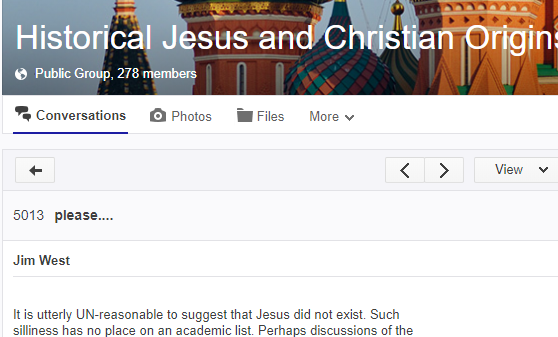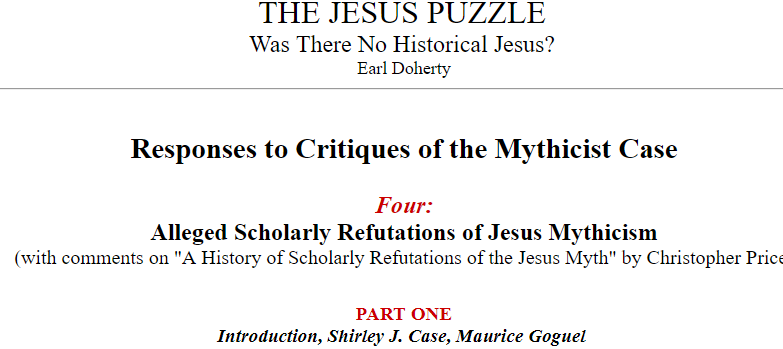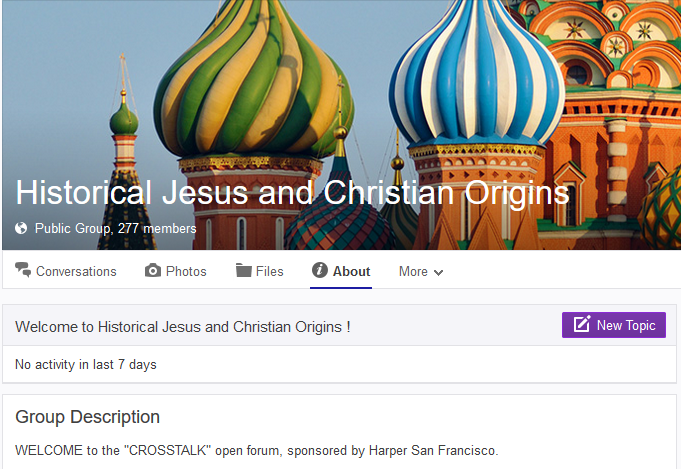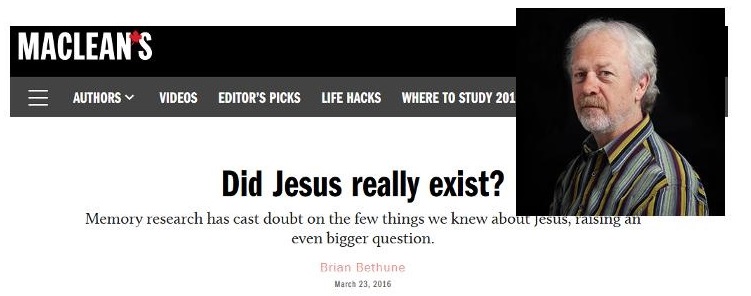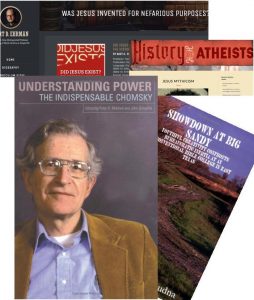 Questioning the historical existence of Jesus attracts something other than mere curiosity or intellectual debate among many biblical scholars and some of the public who don’t even have any personal interest in religion. I can understand people with a personal faith in Jesus either simply ignoring the question with disdain or amusement or responding with some hostility. (One would have to be gauche indeed to even raise the question with them.) But some of us have been mystified by some people, not scholars, who proudly identify as atheists, who can be found to react with visceral invective towards those questioning the historicity of Jesus. Similarly among biblical scholars. Even the non-believer Bart Ehrman dismisses “mythicists” as animated by dishonest motives and culpable ignorance.
Questioning the historical existence of Jesus attracts something other than mere curiosity or intellectual debate among many biblical scholars and some of the public who don’t even have any personal interest in religion. I can understand people with a personal faith in Jesus either simply ignoring the question with disdain or amusement or responding with some hostility. (One would have to be gauche indeed to even raise the question with them.) But some of us have been mystified by some people, not scholars, who proudly identify as atheists, who can be found to react with visceral invective towards those questioning the historicity of Jesus. Similarly among biblical scholars. Even the non-believer Bart Ehrman dismisses “mythicists” as animated by dishonest motives and culpable ignorance.
The answer to that question, at least in my own mind, is now as clear as daylight. Many of us internalize the values and ideology of society’s established intellectual class.
And in fact, most of the people who make it through the education system and get into the elite universities are able to do it because they’ve been willing to obey a lot of stupid orders for years and years—that’s the way I did it, for example. Like, you’re told by some stupid teacher, “Do this,” which you know makes no sense whatsoever, but you do it, and if you do it you get to the next rung, and then you obey the next order, and finally you work your way through and they give you your letters: an awful lot of education is like that, from the very beginning. Some people go along with it because they figure, “Okay, I’ll do any stupid thing that asshole says because I want to get ahead”; others do it because they’ve just internalized the values—but after a while, those two things tend to get sort of blurred. But you do it, or else you’re out: you ask too many questions and you’re going to get in trouble. (Chomsky, 236)
(I use Noam Chomsky’s Understanding Power as the structure for this post because a fellow ex-Worldwide Church of God member reminded me of it in his book of his experiences in that cult, Showdown at Big Sandy. The author, Greg Doudna, spoke of many attempts that both he and a colleague, Russell Gmirkin, made to address doctrinal questions with the hierarchy.)
Some lay people who have been through much of the education system have even gone to such an extreme that they even justify the ruling powers who forced Galileo to recant! Tim O’Neill, author of History for Atheists, is perhaps the best known for this authoritarian stance. Questioning “the consensus of experts” is a sign of arrogance:
* The complaint that a questioning and critical analysis of orthodox views amounts to a “lack of understanding” of them has a long heritage. Back in the days of Galileo and Descartes the rector of the University of Utrecht deplored challenges to the expert consensus views of his day in the following words (1642):
First, it is opposed to the traditional philosophy which universities throughout the world have hitherto taught on the best advice . . . Second, it turns away the young from this sound and traditional philosophy and prevents them reaching the heights of erudition; for once they have begun to rely on the new philosophy and its supposed solutions, they are unable to understand the technical terms which are commonly used in the books of traditional authors and in the lectures and debates of their professors. . . . And lastly, various false and absurd opinions [follow], opinions which are in conflict with other disciplines and faculties and above all with orthodox theology.
(Voetius’s letter to Father Dinet, quoted in Cottingham, 395)
Then analogy [between creationists and mythicists] is not to the degree or nature of the evidence. It’s the lack of understanding* of the material and the arrogance of assuming they know more than the consensus of experts that is analogous. So the analogy is completely apt thanks. (Oct 2, 2018)
The same atheist critic even goes so far as to defend the consensus of the intellectual elites embedded in the Catholic Church against Galileo!
[T]he Church’s opposition to Galileo and heliocentrism was primarily based on this clear scientific consensus. (https://historyforatheists.com/2018/07/the-great-myths-6-copernicus-deathbed-publication/)
Galileo received high praise and encouragement from the Pope down. . . . It was not until Galileo strayed into theological questions with his widely-circulated “Letter to Castelli” in 1615 that the Inquisition began to take an interest in him (https://historyforatheists.com/2018/08/sam-harris-horrible-histories/)
O’Neill elaborates with a citation of a letter by Cardinal Bellarmine that superficially suggests that he was ready to call for a study into revising church doctrine if the new views in astronomy proved true, but overlooks the fact that the Holy See itself flatly rejected such “liberalism” and that Galileo was in branded a heretic for his heliocentric view that contradicted the Bible. (O’Neill following even says Galileo was not charged with “formal heresy” without identifying the source of that term or explaining how “formal heresy” differed from “heresy” per se. Nor should one overlook the words of Galileo’s contemporary, Descartes, who expressed fear for himself at the news of Galileo’s trial. See green side box.)
So we see here a crusade for “better history” by a lay non-historian, an atheist, who cherry-picks quotations and rationalizes submission to the consensus of intellectual elites all the way back to the seventeenth century. Now that’s ‘internalization of the university elite’s values’!
On hearing of Galileo’s fate Descartes wrote in a personal letter, 1634:
Doubtless you know that Galileo was recently censured by the Inquisitors of the Faith, and that his views about the movement of the earth were condemned as heretical. I must tell you that all the things I explained in my treatise, which included the doctrine of the movement of the earth, were so interdependent that it is enough to discover that one of them is false to know that all the arguments I was using are unsound. Though I thought they were based on very certain and evident proofs, I would not wish, for anything in the world, to maintain them against the authority of the Church. I know that it might be said that not everything which the Roman Inquisitors decide is automatically an article of faith, but must first be approved by a General Council. But I am not so fond of my own opinions as to want to use such quibbles to be able to maintain them. I desire to live in peace and to continue the life I have begun under the motto ‘to live well you must live unseen’. . . . For I have seen letters patent about Galileo’s condemnation, printed at Liège on 20 September 1633, which contained the words ‘though he pretended he put forward his view only hypothetically’; thus they seem to forbid even the use of this hypothesis in astronomy. For this reason I do not dare to tell him any of my thoughts on the topic. Moreover, I do not see that this censure has been endorsed by the Pope or by any Council, but only by a single congregation of the Cardinals of the Inquisition; so I do not altogether lose hope . . .
(Kenny, ed. pp. 42f. The message sent to Descartes was that Galileo was not even permitted to teach his view as an unproved ‘hypothesis’, contrary to the weight O’Neill assigns to Cardinal Bellarmine’s apparent statement otherwise. Still, as can be seen from D’s conclusion, he continued to hope for better days.)
Surely we have here a credible explanation for the vociferous backing of the “mainstream scholarly consensus” among certain lay persons, atheist or otherwise.
But there is more than years of indoctrination and internalization of such values.
And there are many other subtle mechanisms which contribute to ideological control as well, of course . . . .
Or just take the fact that certain topics are unstudiable in the schools—because they don’t fall anywhere: the disciplines are divided in such a way that they simply will not be studied. That’s something that’s extremely important. . . .
Well, these [corporate controls of political systems and national resources, including national populations] are major phenomena of modern life—but where do you go to study them in the universities or the academic profession? That’s a very interesting question. You don’t go to the economics department, because that’s not what they look at: the real hot-shot economics departments are interested in abstract models of how a pure free-enterprise economy works—you know, generalizations to ten-dimensional space of some nonexistent free-market system. You don’t go to the political science department, because they’re concerned with electoral statistics, and voting patterns, and micro-bureaucracy—like the way one government bureaucrat talks to another in some detailed air. You don’t go to the anthropology department, because they’re studying hill tribesmen in New Guinea. You don’t go to the sociology department, because they’re studying crime in the ghettos. In fact, you don’t go anywhere—there isn’t any field that deals with these topics. There’s no journal that deals with them. In fact, there is no academic profession that is concerned with the central problems of modern society. (239-242)
And ditto for the study of the question of the origin of the Jesus figure. New Testament scholars study Christology and the different views of the Jesus figure in the various sources, but they take for granted as their starting position that such a historical figure did exist. Hence in 2012 Bart Ehrman was able to confidently write:
Odd as it may seem, no scholar of the New Testament has ever thought to put together a sustained argument that Jesus must have lived. To my knowledge, I was the first to try it (Ehrman 2012)
Before commenting let’s finish Chomsky’s words:
And it’s extremely important that there not be a field that studies these questions—because if there ever were such a field, people might come to understand too much, and in a relatively free society like ours, they might start to do something with that understanding. Well, no institution is going to encourage that. I mean, there’s nothing in what I just said that you couldn’t explain to junior high school students, it’s all pretty straightforward. But it’s not what you study in a junior high [course] . . . .
(Chomsky, 242)
Daniel Gullotta
- Gullotta’s Review of Carrier’s OHJ: A Brief Comment
- How Bayes’ Theorem Proves the Resurrection (Gullotta on Carrier once more)
- Daniel Gullotta’s Review of Richard Carrier’s “On the Historicity of Jesus”: that “born of a woman” passage (again)
- Continuing Gullotta’s Review of Carrier’s On the Historicity of Jesus
- Gullotta’s review of Carrier’s argument #2: relating to Jesus’ birth and humanity
- Gullotta’s review of Carrier’s argument #3: crucified by demons or Romans?
- Gullotta’s review of Carrier’s On the Historicity of Jesus, point #4, “James, the brother of the Lord”
- Daniel Gullotta’s Review of Richard Carrier’s On the Historicity of Jesus
- Gullotta’s Misleading Portrayal of Carrier’s Argument (Gospels Myth or Remembered History? – Part 1)
- Gullotta’s Misleading Portrayal of Carrier’s claims…. Part 2
- Gullotta’s Dysrepresentation of Carrier’s Case for the Gospels as Myth … Part 3
- Further Daniel Gullotta Disrepresentation of Carrier’s On the Historicity of Jesus
- Rank-Raglan hero types and Gullotta’s criticism of Carrier’s use of them
- Continuing Gullotta’s Criticism of Carrier’s Use of the Rank-Raglan Archetypes
- Gullotta, Carrier and the point of the Rank-Raglan classification (Or, Can Carrier’s RR reference class be justified?)
- Gullotta’s Concluding Comments on Carrier’s On the Historicity of Jesus
- Gullotta on Carrier’s On the Historicity of Jesus: One Final Irony (or Misunderstanding? or…?)
Simon Gathercole
- Addressing Simon Gathercole’s “Historical and Human Existence of Jesus” (#1)
- Addressing S. Gathercole’s Case for Jesus’ Humanity: “Born from a Woman” (#2)
- Addressing S. Gathercole’s Case: “Born from a Woman” (#3)
- Addressing S. Gathercole’s Case for Jesus’ “Humanity” continued: Misrepresentations (#4)
- Simon Gathercole’s Failure to Address Mythicism: (#5)
It is at this point that we find an explanation for a type of response by the Ehrmans, the McGraths, and others against mythicism. I am talking about the default targeting of personal motives, even personal morality and character, of proponents of the Christ Myth view. Equally depressing is that these accusations are coupled with bizarre distortions, misrepresentations, blatant “misunderstandings” of the mythicist arguments. Recall the somewhat bizarre reviews of mythicism by Daniel Gullotta and Simon Gathercole in scholarly Journal for the Study of the Historical Jesus for biblical scholars. (The general public can read one of its articles if they are prepared to pay $US30 — per article — for the privilege.) We saw how both Gullotta and Gathercole [see side box for references] clearly felt free to not pay any serious attention to the arguments they believed they were discussing and gross misrepresentation was par for the course. Compare:
MAN: What I’m struck with in each of the . . . major misunderstandings that are used against you. . . . is how much your views have been distorted and oversimplified by the press. I don’t understand why you’d want to keep bringing these ideas to the mass media when they always insist on misrepresenting them.
[Chomksy:] But why is that surprising? First of all, this is not happening in the mass media, this is happening in the intellectual journals. And intellectuals are specialists in defamation, they’re basically commissars [Soviet officials responsible for political indoctrination]—they’re the ideological managers, so they are the ones who feel the most threatened by dissidence. The mass media don’t care that much, they just ignore it, or say it’s crazy or something like that. In fact, this stuff barely enters the national media; sure, you’ll get a throwaway line saying, “this guy’s an apologist for this that and the other thing,” but that’s just feeding off the intellectual culture. The place where it’s really done is inside the intellectual journals—because that’s their specialty. They’re commissars: it’s not fundamentally different from the Communist Party. (Chomsky, 206)
“It’s the ideology, stupid!” It is easy to be dismayed (as I know I have been) at the utter “disunderstanding” of the arguments they say they are addressing. But notice that there’s another explanation:
But if any of you have ever looked at your F.B.I. file through a Freedom of Information Act release, you’ve probably discovered that intelligence agencies are in general extremely incompetent—that’s one of the reasons why there are so many intelligence failures: they just never get anything straight, for all kinds of reasons. And part of it is because the information they get typically is being transmitted to them by agents and informants who are ideological fanatics, and they always misunderstand things in their own crazy ways. So if you look at an F.B.I. file where you actually know what the facts are, you’ll usually see that the information has some relation to reality—you can sort of figure out what they’re talking about—but by the time it’s worked its way through the ideological fanaticism of the intelligence system, there’s been all sorts of weird distortion. And that’s true of the Anti-Defamation League’s intelligence too.
But this stuff certainly is circulated around—like, probably somebody in this area received it from the regional office, and there’ll be some article in the local newspaper tomorrow that’ll pull a lot of junk out of the file, that’s what usually happens when I go places. And the point is that it’s used to close off the discussion: since they can’t deal with the issues, they’ve got to close off the discussion—and the best way to do it is by throwing enough slime so that maybe people will figure, where there’s smoke there’s fire, so we’d better not listen.
. . . But there are plenty of others who do the same sort of thing—because this is really the institutional task of the whole intellectual community. I mean, the job of mainstream intellectuals is to serve as a kind of secular priesthood, to ensure that the doctrinal faith is maintained. So if you go back to a period when the Church was dominant, the priesthood did it: they were the ones who watched out for heresy and went after it. And as societies became more secular in the eighteenth and nineteenth centuries, the same controls were needed: the institutions still had to defend themselves, after all, and if they couldn’t do it by burning people at the stake or sending them to inquisitions anymore, they had to find other ways. Well, over time that responsibility was transferred to the intellectual class—to be guardians of the sacred political truths, hatchet-men of one sort or another.
So you see, as a dissident, you shouldn’t be surprised to get all of this stuff done to you, it’s in fact a positive sign—it means that you can’t just be ignored anymore. (207f)
Continue reading “Understanding the Hostility to the Christ Myth Theory”



